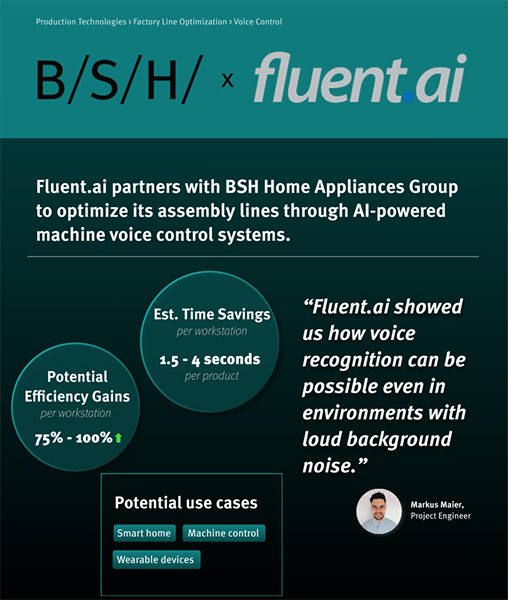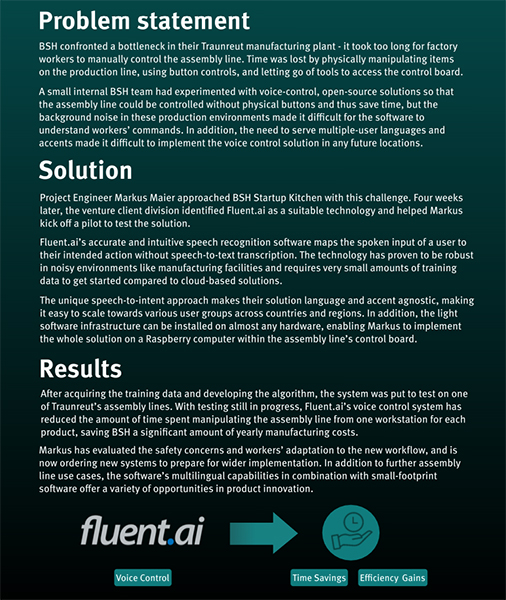Manufacturers can adopt voice recognition technology for a smarter, optimized factory line that boosts productivity and reduces costs.
Manufacturing is a booming and competitive industry with the global market expected to grow from $86.7B in 2020 to $117.7B by 2025. Innovation in manufacturing technology has had profound impacts on factory floor processes, setting the stage for the assembly line of the future. One area technology is most poised to improve in manufacturing is factory worker efficiency.
In traditional factory settings, operators manually control the production line, requiring them to press physical buttons at each workstation to move products along the assembly line. This process causes major delays in workflow that translates to higher production costs. However, Industry 4.0, the latest Industrial Revolution that’s automating traditional manufacturing and industrial practices through modern smart technology, and advancements in speech recognition solutions, are now helping to streamline processes on the factory floor, ultimately leading to cost savings for manufacturers.

When considering voice technology to improve factory efficiency, manufacturers must evaluate multiple areas of the technology’s functionality. Factory floors are loud and, therefore, the technology must be robust and able to operate in noisy environments. Furthermore, it must be scalable to be deployed easily in factories in other markets and regions, which means it needs to be intuitive enough to understand multiple languages and accents to accommodate factory workers. Finally, factory operator fatigue and ergonomics are critical areas that directly correlate to efficiency and productivity. The value of good ergonomics in the manufacturing industry is key to running a lucrative organization, not just for the safety of employees but for complete business financial and operational success.
BSH, Europe’s leading manufacturer of connected home appliances, noticed major inefficiencies in its factories with operators taking up to four seconds to move products between each workstation. To improve these processes, BSH set out to find a solution that would increase efficiency on the production line and, in turn, improve ergonomics for its factory workers. Soon after, through their venture client group, BSH Startup Kitchen, BSH launched its partnership with Fluent.ai, a Canadian embedded voice recognition solutions company, to brings its offline voice automation solution to one of its German factories. Fluent.ai developed and deployed an intuitive, offline voice control solution that leverages Fluent.ai’s patented, low-latency technology that was built to be robust in noisy environments.
Once deployed, BSH factory workers were able to operate heavy machinery by speaking into a hands-free headset connected to an embedded voice recognition system. The factory operator dictates a wake word followed by a command to trigger the appropriate movement of the appliance on the assembly line. Fluent.ai’s unique speech-to-intent voice recognition technology can be easily trained to understand any language, accent, and even speech impediments, allowing BSH to easily scale and deploy the technology in factories around the world. The solution also offers improved ergonomics, as workers can conveniently operate the assembly line hands-free, eliminating the need for physically manipulating products and manually operating the control board on the production line.

Early results from the partnership show major improvements to factory worker productivity with up to 75-100% efficiency gains in managing the assembly line by reducing manual intervention. BSH has seen a massive reduction of time spent manipulating the assembly line, reducing transition time from four seconds to one and a half seconds per product, saving BSH a significant amount of yearly manufacturing costs. The edge deployment of the technology also solves data protection-related challenges, as users’ voice data is never sent to the cloud, nor stored on device. After a successful initial implementation of the technology and adaptation to the new workflow that has proven both technical feasibility and business viability, BSH is now preparing for wider adoption of the solution in its factories in other regions.
This case study thoroughly demonstrates how technology is shaping the future of the factory. Speech recognition solutions not only improve inefficiencies in factory workflows to increase production efficiency and reduce manufacturing costs but can also boost job satisfaction which improves employee retention and, in turn, reduces more costs. As Industry 4.0 further transforms manufacturing, companies within this space are poised to be more competitive against industry disruptors through process optimization, but they must invest in the latest advancements in voice technology to stay ahead of the game.

About the Author:
Dr. Vikrant Tomar is the CTO and Founder of Fluent.ai, a Montreal-based speech understanding and voice user interface software for device OEMs and service providers. He is a well-known researcher in machine learning, especially deep learning, and its applications to speech recognition. He has a PhD in machine learning and speech recognition from McGill University.
In this episode, I sat down with Beejan Giga, Director | Partner and Caleb Emerson, Senior Results Manager at Carpedia International. We discussed the insights behind their recent Industry Today article, “Thinking Three Moves Ahead” and together we explored how manufacturers can plan more strategically, align with their suppliers, and build the operational discipline needed to support intentional, sustainable growth. It was a conversation packed with practical perspectives on navigating a fast-changing industry landscape.